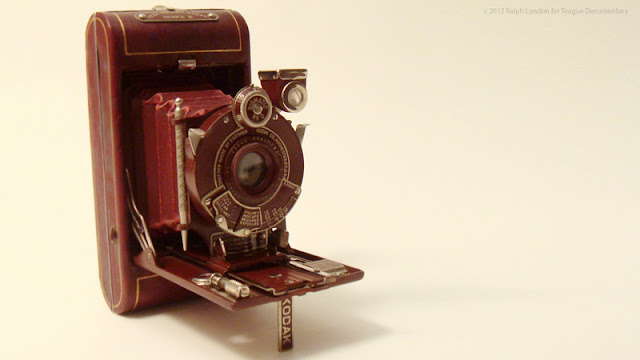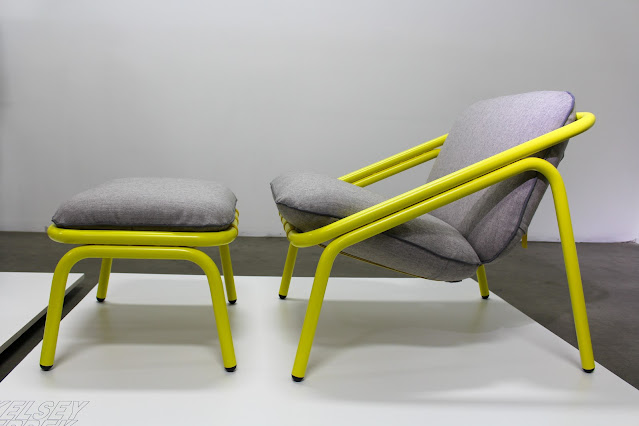Teague Documentary Update - Oct 2012
 |
| The Vanity Kodak of 1928. owned and photographed by Ralph London. |
It's time for an
update on the progress of the Walter D. Teague
documentary. My last update was
July 2011 when I returned from my research trips to New York City, Aspen,
Oregon and Denver. Well, the reality is that when classes start in
September (being a full-time professor) I don't have much time to work on the
doc at all. But, in the fall, I worked with my industrial design students
to recreate, digital models of some of Teague's greatest designs. They
painstakingly studied photographs and patent drawings to make these designs
with Solidworks software. Kodak cameras, Steuben glass, and Sparton radios were
re-created so that we can show them 3 dimensionally and animate them for the film! It's going to look amazing!
 |
| The raw, unrendered Solidworks model of the Sparton Sled radio model 557 1936. Modeled by Sean Missal. |
I was privileged to be able to attend and speak at the Walter
Dorwin Teague exhibition opening in Waitsfield, Vermont on June 1st. The
show "His Life, Work and Influence" was organized by his
granddaughter Allison Teague and ran through August 31st,
2012. I was excited to find some items that I've never seen and
some that I didn't know existed anymore. Such as a beautiful drafting
desk from the WDTA office in New York. The treasure for me was to find Teague's
handwritten diary from 1898 to 1899 (14 to 15 years old). Allison was
gracious enough to allow me to read it and transcribe it. I will reveal
some of the exciting new discoveries hidden within in the upcoming
documentary. Here's some photos from the exhibition:
Then, in July, I took an incredible road trip with my family along the coast of
Oregon and California. Our southern most stop was in San Diego, where I
visited the Ford Tower in Balboa Park. Designed by Walter D. Teague and
his staff, based on a building by Albert Kahn. Built for the 1935 California
Pacific International Exposition. See some of the photos here: http://idsandbox.blogspot.com/2012/07/ford-tower-balboa-park-san-diego.html
While the building is interesting, in the Teague company archives, I found some
photos of the exhibit on the inside even more fascinating.
Lately, I connected with camera historian, Ralph London, who has a collection
of Teague design himself. He photographed his 1928 Vanity Kodaks (all five
colors) and sent them to me. (See the Facebook page) I also found a precious
little Baby Brownie of 1934 on eBay for my own.
Another connection was made with a former designer who worked for Teague from 1953, Arch Drummond. Arch wrote some incredible stories for me about his experiences there, some of his design work, his relations with WDT, and a comprehensive story of the Boeing 707 design mock-up. You'll hear Arch's story of how the intense demands of working at WDTA nearly broke-up his marriage in the film.
Another connection was made with a former designer who worked for Teague from 1953, Arch Drummond. Arch wrote some incredible stories for me about his experiences there, some of his design work, his relations with WDT, and a comprehensive story of the Boeing 707 design mock-up. You'll hear Arch's story of how the intense demands of working at WDTA nearly broke-up his marriage in the film.
All through August and September has been research and script writing. My
sabbatical began in September and I have been spending most of my time in the
library, reading and working on the script, which is nearly complete. I am also
in the midst of organizing and cataloguing all of the hundreds of photographs
and many hours of interviews that I have so far. I have finished reading and taking notes on
about 160 articles about and by Walter D. Teague. Thanks to the TEAGUE office
for scanning and collecting most of them in their archives. After 2 years and 7
months, I'm calling the research phase of this project over.
 |
| Could this be the book that inspired a young Walter D. Teague to study art? |
New discovery! Teague says that he read a book
on architecture in his high school library (about 1902) that inspired him to
become an artist, but he doesn't say which one it was. I wanted to find out
which book that was. The clues are; it's a general book on architecture, full of illustrations, it's published
before 1902, and it covers gothic architecture. And I think that this is it: The Illustrated Handbook of Architecture by James Fergusson - 1855. Available
on Google Books for free if you want to read it yourself. The illustrations are
incredible!
I'm aiming to finish in June of 2013 and will be submitting it to film festivals. And, soon I will be putting
together a Kickstarter fund raising campaign for the
film. I'll be sure to let you know about it.
Meanwhile, be sure to
"Like" the Facebook page and get updates every week.
Thanks,
J. A. Morris



Comments